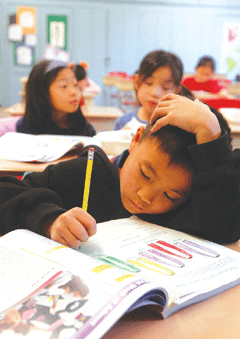By Ernest Scheyder
On a brisk Sunday morning deep in Chinatown, John Hum is teaching his third-grade Catholic catechism class about Adam and Eve.
“What did they do that was so bad?” Hum asked.
“They ate the apple from the tree,” said Cristabel, 8, a sprite of a child wearing green dungarees and a flower-print shirt.
“But what’s wrong with that?” Hum prods. “We all love apples.”
“Because God told them not to do it,” Cristabel said.
The moral, Hum said, is to not “do anything God does not want you to do.”
Workers at Church of the Transfiguration on Mott St. see their greatest success in children of immigrants, who often were born in the United States and stand with one foot in their Chinese past and another in their American future. The church’s Sunday school classes teach the Catholic faith to area children, and some non-Catholic parents see it as a chance for free babysitting, said Sister MaryAnn Scherr, a nun overseeing religious education at the church.
“My teachers and I work to get them grounded, but always in a faith approach,” Scherr said recently, her short brown hair neatly cropped. “Our goal is really to help them in terms of social skills and tell them that God loves them.”
Every Sunday morning, Scherr and her team of religious educators teach Catholic catechism to parish children. It is a task fraught with complexities, as often these children know very little about Christianity.
“When people come to us, they often come with no religion at all,” Scherr said. “Some of the parents don’t see the value of the religion program.”
Down one flight of stairs from John Hum’s class, Jennifer Yau teaches first graders about books of the Bible, and routinely struggles with non-attentive students.
“This is boring,” said James, a tiny six-year-old boy with an untucked collared shirt, one leg up on his chair, the other dangling above the floor. “I don’t know it.”
“There is no, ‘I don’t know.’ That’s not an option,” said Yau, visibly at wits’ end. “I’m trying to teach you guys something and you’re not really paying attention, so I’d appreciate it if you would.”
At the end of the period, the class prayed and then made the sign of the cross. A crucifix peered down at them from the wall.
“If you don’t mean that, it means you don’t like God,” Kevin, a spry six-year-old, said to James.
“That’s not true,” James said, before Yau stepped in and sent them on their way.
“I want to force them to pay attention,” Yau, 24, said later. “In kindergarten it was play time all the time, and now it’s an adjustment to a new way of learning and doing.”
Overall, progress is being made, Scherr said.
“We can have as many as 30 people we baptize each year,” she said. “Many are men.
“We try not to be people who just work to get certificates,” Scherr said. Too often, she says, immigrants believe their participation in church activities will guarantee them citizenship, or at least a green card.
“If they want to really be baptized, then we work with that,” Sherr said. “It’s not completely our job to doubt sincerity.”
As Chinese immigrants come into the city, they bring with them their own ideas and customs. In the Chinese province of Fujian, where most of Chinatown’s newest residents emigrate from, it is perfectly O.K. for someone to spit on the floor, even when inside, since most floors there are dirt, Scherr said. The church staff has tried to limit spitting and educate immigrants on American social conventions.
“We bend over backwards for the people,” Scherr said. “We don’t squash what they have experienced. We try to reverence it. When you can respect people and where they are coming from, you get more done.”
Originally from Wisconsin, Scherr said she became a nun to spread God’s love. She is a member of the Sisters of St. Agnes, a religious organization headquartered in her home state that seeks to serve in social service fields throughout the U.S. and Latin America.
“I’ve been given a special gift of forgiveness,” she said.
As the only non-Chinese speaker on the church’s staff, Scherr’s mission is a difficult one: Oftentimes she can’t communicate with the very people she is trying to help. While the Sunday school classes are taught in English, some of the students’ parents have a difficult time understanding it, Scherr said. A few years ago she took a Mandarin class for eight weeks, and discovered she wasn’t a “language person.”
“I just knew I wasn’t going to get it,” she said. Today, she relies on translators to help her. In Chinatown, Mandarin and Cantonese are the prevailing Chinese dialects, and the church holds services in them, in addition to English. Fujianese, however, is slowly creeping in as more immigrants from the Fujian province come to New York.
Scherr said the current trend among American youth to leave organized religion does weigh on her conscience, but she is confident she and her teachers have a positive effect. The majority of her students continue religious study in high school and stay active in the church as adults, she said.
“I don’t lose kids,” she said.

































